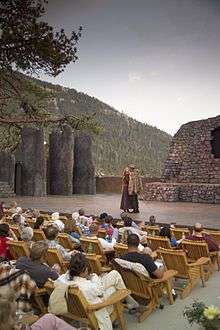Lake Tahoe Shakespeare Festival
The Lake Tahoe Shakespeare Festival (LTSF) brings the bard to life on the shores of Lake Tahoe.

Performing a series of Shakespeare classics and introducing more contemporary works, audience members take their seats on the beach overlooking the lake.
History
The Lake Tahoe Shakespeare Festival began in 1972 at Sugar Pine Point State Park on the west shore of Lake Tahoe. The New Shakespeare Company presented eight performances during its inaugural season. The Lake Tahoe Shakespeare Festival continued there for four years, until it ran into scheduling conflicts over the use of Sugar Pine Point's Ehrman Mansion.
In 1976, the company and Nevada State Parks agreed to hold the performances at Sand Harbor - even though it was considered to be a less accessible location. A bare-bones stage was hastily built for just over $1,000 in materials and labor. In 1976, the first year at Sand Harbor State Park.
At first, the Lake Tahoe Shakespeare Festival was managed by the staff of Lake Tahoe Nevada State Park. In 1982, the North Tahoe Fine Arts Council (NTFAC) began "Tunes in the Dunes" and took over the management of the Lake Tahoe Shakespeare Festival. The Festival prospered under the direction of NTFAC and became a cultural tradition at the park. Each year, more and more people made the trip to enjoy a picnic and a play under the stars at Sand Harbor. But in 1992, the North Tahoe Fine Arts Council folded and a new manager for the Festival was needed.
The Incline Village Crystal Bay Visitors and Convention Bureau was selected to manage the Lake Tahoe Shakespeare Festival. In 1995, a long-term contract was signed with the Lake Tahoe Shakespeare Festival, a non-profit group dedicated to managing and improving the performances at Sand Harbor. As part of the agreement, the LTSF, completely through private funding, constructed a state of the art stage facility. The Warren Edward Trepp Stage, built at a cost of nearly two million dollars, was dedicated at the start of the 2000 season.
In May 1999, the Parasol Foundation, a non-profit community foundation, was awarded a grant from the Donald W. Reynolds Foundation through the Community Services Center Program. The Community Services Program is designed to help privately supported, non-profit organizations with 501 C (3) status, join together to house their operations in a shared facility.
In 2010 the Festival hired artistic director Charles Fee to improve flagging attendance and sponsorship shortfalls due to "economic woes".[1] Fee is now the producing artistic director for three Shakespeare festivals concurrently, including Great Lakes Theater Festival in Cleveland, Ohio and Idaho Shakespeare Festival in Boise, ID.
Educational outreach program
The D.G. Menchetti Young Shakespeare Program
The Lake Tahoe Shakespeare Festival offers twelve free matinee performances throughout the Reno-Tahoe-Truckee region during the summer, specifically written and directed for a younger audience. The abbreviated performances offer an introduction to theatre for children.
InterACT workshops
Offered to schools and community groups in Nevada and California from February to September, these workshops are highly interactive and feature activities to help students understand the themes of Shakespeare's works, as well as to learn acting and performance skills.
Other performances
For the last few years the Lake Tahoe Shakespeare Festival has included more than Shakespeare performances to the Sand Harbor Amphitheatre to entertain residents and visitors to the Reno–Lake Tahoe region, including performances by the Reno Philharmonic Orchestra, Chautauqua, Reno Jazz Orchestra, Pacific Mambo Orchestra and the Sierra Nevada Ballet.
References
| Wikimedia Commons has media related to Lake Tahoe Shakespeare Festival. |